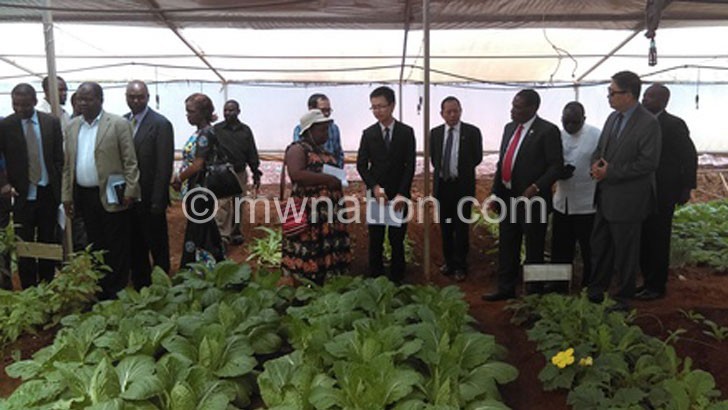‘Horticulture is lucrative diversification avenue’
The Ministry of Agriculture, Irrigation and Water Development says it is considering horticulture as one of the commercially-viable diversification avenues.
The ministry is working in partnership with the Chinese Government on a demonstration project—Malawi-China Agricultural Technical Cooperation Farm—which is close to Lilongwe University of Agriculture and Natural Resources Natural Resources College (NRC) campus in Lilongwe.
Among other things, the centre has built and rehabilitated farm infrastructure and has also trained local agricultural practitioners, especially in horticulture.

Speaking during a visit to the demonstration site, Minister of Agriculture, Irrigation and Water Development Joseph Mwanamvekha said government wants to see Malawi producing high-quality farm produce that can be exported to earn the country foreign exchange.
“Government is advocating for diversification to other commercially-viable crops to supplement tobacco. One such avenue is horticulture and as we work towards improving this sector, we need specially trained horticulturalists that can facilitate production of high-quality produce that will be competitive on the international market,” he said.
Chinese Ambassador Liu Hongyang said the demonstration project will help Malawi to export agricultural products.
“This is the second time to visit this farm since my arrival in Lilongwe three months ago. So, you can see that I put emphasis on this farm. This is because agriculture is one of the priority areas set between the two presidents [Peter Mutharika and Xi Jinping] when they met in Beijing, China,” he said.
In the first phase, the Chinese Government invested 10 million yuan (about K1 billion) in the 15-hectare Malawi-China Agricultural Technical Cooperation Farm.
The first phase, which ran from 2014 to 2016, focused on vegetable greenhouses, irrigation facilities and a pump station, among other things.
The second phase is running up to 2019 with an investment of 20 million yuan (about K2.1 billion) and has trained more than 2 000 farmers and students. n




